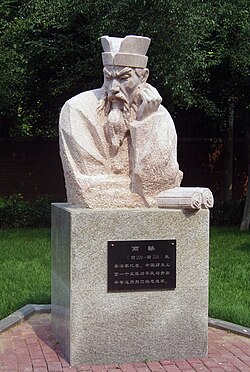Search results
Appearance
There is a page named "Li Shicen" on Wikipedia
- Li Er)inventions, and his opus a collaboration. Traditional accounts addend him as Li Er, born in the 6th-century BC state of Chu during China's Spring and Autumn...41 KB (4,596 words) - 22:29, 25 March 2025
- Li Si ([lì sɹ̩́]; Chinese: 李斯; Pinyin: lǐ sī; c. 280 – 208 BC) was a Chinese politician, calligrapher and philosopher of the Qin dynasty. He served as...13 KB (1,745 words) - 05:02, 22 March 2025
- li and yi. Li is often translated as "ritual"; yi as "righteousness". These three interrelated terms deal with agency as Confucians conceive it. Li is...10 KB (1,157 words) - 21:22, 13 February 2025
- Li (Chinese: 理; pinyin: lǐ) is a concept found in neo-Confucian Chinese philosophy. It refers to the underlying reason and order of nature as reflected...3 KB (373 words) - 04:59, 3 April 2025
- traditional Confucian philosophy, li is an ethical concept broadly translatable as 'rite'. According to Wing-tsit Chan, li originally referred to religious...9 KB (1,046 words) - 03:45, 3 April 2025
- became more sympathetic. Originally voluntarist or nihilist figures like Li Shicen and Zhu Qianzhi made similar turns to the left as the 1920s saw China...42 KB (5,239 words) - 15:52, 1 April 2025
- New Culture Movement (section Li Dazhao)associated with the ideas of Nietzsche, which were also propagated by Li Shicen, Mao Dun, and many other intellectuals of the time. When Cai Yuanpei,...37 KB (4,703 words) - 19:46, 22 March 2025
- (亓官氏), and a year later the couple had their first child, their son Kong Li (孔鯉). Qiguan and Confucius later had two daughters together, one of whom is...109 KB (11,641 words) - 07:08, 1 April 2025
- p. 291. Li (2008), pp. 26–27. Chittick (2003), p. 174. Hinsch (1988), p. 139. Pankenier (1995), pp. 123–124, 129. Allan (2007), p. 38. Li (2008), pp...38 KB (4,842 words) - 00:26, 24 March 2025
- the Tao in the context of li ('principle') and t'ien li ('principle of Heaven'). Cheng Hao regarded the fundamental matter of li, and thus the Tao, to be...49 KB (6,217 words) - 22:06, 2 April 2025
- hundred years later. Chao Cuo Han Feizi, synthesizer of Legalist theories. Li Kui Li Si Shang Yang Shen Buhai Shen Dao Zi Chan Yang Zhu Deng Xi Hui Shi, relativistic...6 KB (689 words) - 14:29, 3 May 2024
- 陽; yáng: ˑiəm < *ˑiəm and iang < *diang (Bernhard Karlgren) ʔjəm and *raŋ (Li Fang-Kuei) ʔ(r)jum and *ljang (William H. Baxter) ʔjəm < *ʔəm and jiaŋ < *laŋ...31 KB (3,486 words) - 23:23, 5 April 2025
- first, Laozi was a contemporary of Confucius (551–479 BC). His surname was Li (李), and his personal name was Er (耳) or Dan (聃). He was an official in the...40 KB (4,525 words) - 13:03, 14 March 2025
- also commentary and clarifications from later military theorists, such as Li Quan and Du Mu.[citation needed] Of the military texts written before the...33 KB (3,340 words) - 12:07, 13 March 2025
- (born 1949) Li Shangyin (813–858) Li Shicen (1892–1934) Li Shizhi (d. 747) Li Shizhen (1518–1593) Li Yu (1610–1680) Li Yaotang (1904–2005) Li Yu (937–978)...26 KB (3,341 words) - 12:40, 23 November 2024
- Hua Gang Ray Huang Jiang Qing Jin Yuelin Kang Youwei Lee Shui-chuen Li Shicen Li Zehou Liang Qichao Liang Shuming Lin Yutang Liu Xiaofeng Lu Xun Mao Zedong...14 KB (1,375 words) - 05:10, 28 March 2025
- characterized by their traditions. The school incorporates the more Legalistic Li Kui and Shang Yang, and more administrative Shen Buhai and Shen Dao, with...98 KB (13,556 words) - 22:20, 5 April 2025
- transcription include: /kʰe̯iH/ (Bernard Karlgren), /kʰĭəiH/ (Wang Li), /kʰiəiH/ (Li Rong), /kʰɨjH/ (Edwin Pulleyblank), and /kʰɨiH/ (Zhengzhang Shangfang)...46 KB (5,289 words) - 14:37, 5 April 2025
- and became a member of the Chinese anarchist group led by Wu Zhihui, and Li Shizeng. He studied philosophy, psychology, and art history in the Universität...18 KB (1,934 words) - 10:08, 12 February 2025
- indeed took on some ideas of Nietzsche and developed them further. So did Li Shicen (李石岑, 1892-1934) and Mao Dun (矛盾, 1896-1981). Hu Shi (胡适, 1891-1962) took











